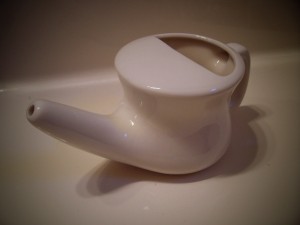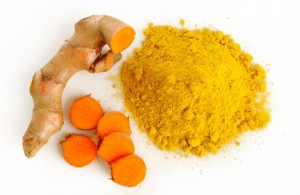I am frequently asked about seasonal allergies this time of year. Traditional allopathic medications tend to make people feel exhausted, sluggish, and dry. There are many alternatives to taking these kinds of medications that will still be powerful allies in controlling your allergic symptoms.
 The first of these is a neti pot. Neti pots can be used to bathe the nasal passages, thereby washing away some of the irritants to which you are exposed. A neti pot is a small teapot-like device that is used to pour a saline solution (water and pure salts combined in a ratio similar to the body’s ratio) in one nostril and allow it to drain out of the other. This takes a little practice but the benefits are tremendous. The best way to use these is on a daily basis as preventive medicine during the time of year when you know your allergies tend to flareup.
The first of these is a neti pot. Neti pots can be used to bathe the nasal passages, thereby washing away some of the irritants to which you are exposed. A neti pot is a small teapot-like device that is used to pour a saline solution (water and pure salts combined in a ratio similar to the body’s ratio) in one nostril and allow it to drain out of the other. This takes a little practice but the benefits are tremendous. The best way to use these is on a daily basis as preventive medicine during the time of year when you know your allergies tend to flareup.
In addition to using water to wash out your nasal passages, it is important to drink more water to flush out your system from inside. I recommend drinking a big glass of water first thing in the morning right when you get up. This flushes out toxins from your system that have accumulated overnight while you sleep.
Many people are not aware that acupuncture and herbal medicine is also very powerful for allergies of all types. After treating several patients for their seasonal or food allergies, those allergies have resolved completely in some cases and been significantly reduced in others. Acupuncture influences the immune system to teach it to behave in a more “appropriate way” when exposed to dust, pollens, other airborne allergens, and various foods.
 Lastly, there are several spices with medicinal properties that you can add to your meals when preparing them. First is turmeric. Turmeric can be purchased in it’s whole form, similar to ginger, or ground in the spice aisle. Turmeric is also an anti-inflammatory herb that can be used in cooking when your allergies are flaring up. Additionally, thyme and oregano, either fresh or dried, are excellent decongestants when your nose is stuffy.
Lastly, there are several spices with medicinal properties that you can add to your meals when preparing them. First is turmeric. Turmeric can be purchased in it’s whole form, similar to ginger, or ground in the spice aisle. Turmeric is also an anti-inflammatory herb that can be used in cooking when your allergies are flaring up. Additionally, thyme and oregano, either fresh or dried, are excellent decongestants when your nose is stuffy.
To learn more about other natural allergy remedies, I would recommend this outstanding article from WebMD: Natural Allergy Remedies


